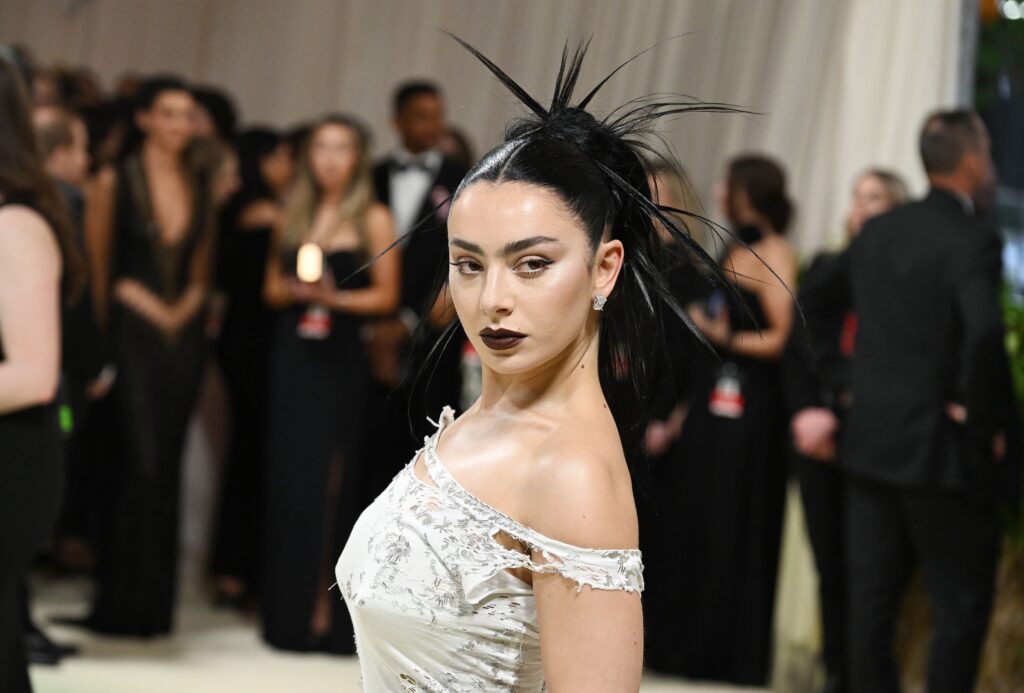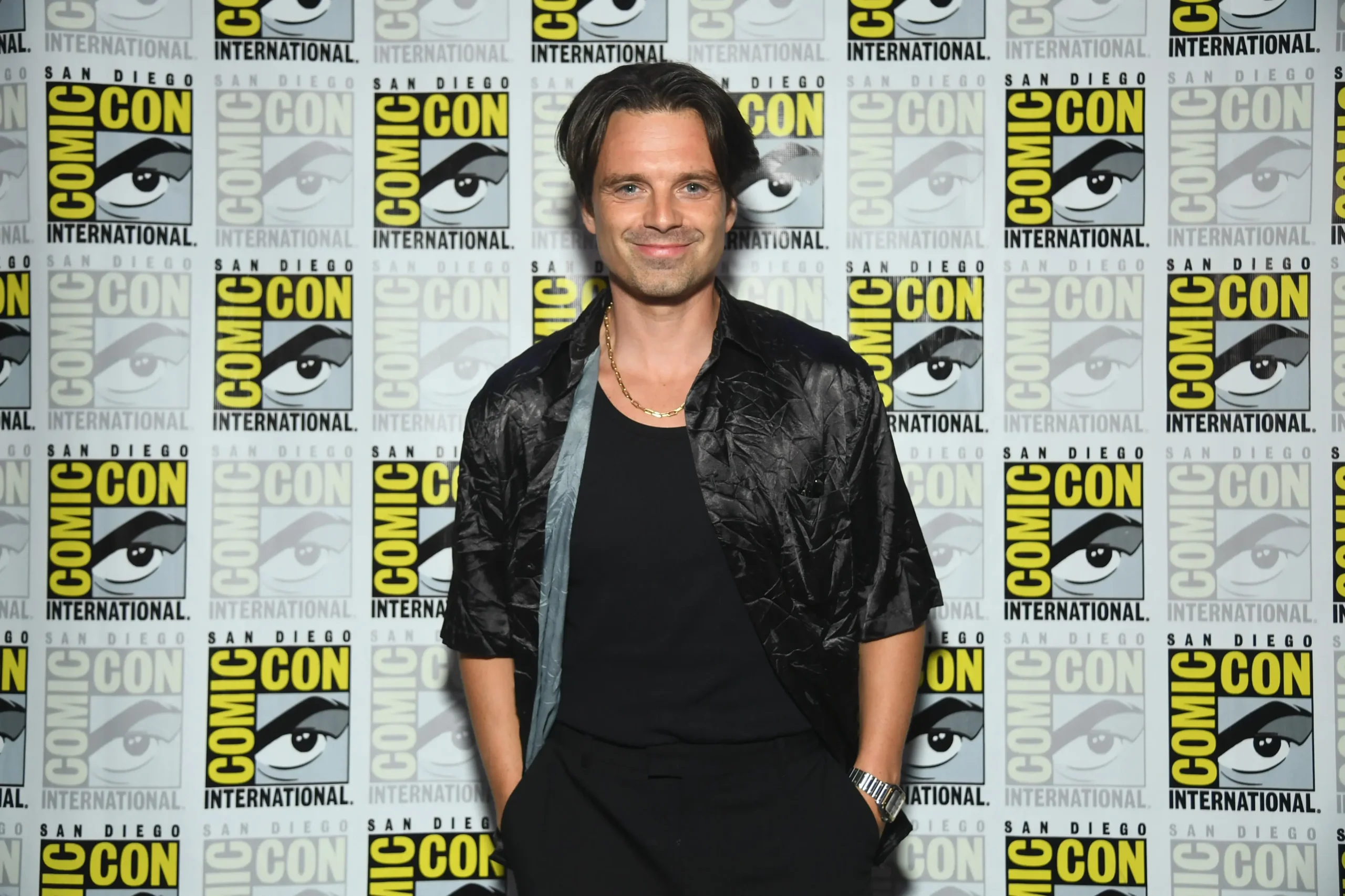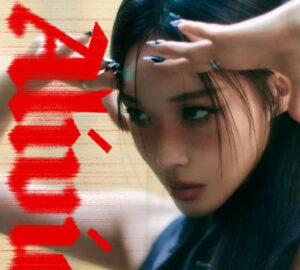There are few artists today who understand the choreography of self-presentation like Charli XCX. Her entire career has been a performance of reinvention, a running dialogue between authenticity and artifice, pop and critique, sincerity and satire. In 2026, that dialogue takes cinematic form with The Moment, her forthcoming feature film produced by A24.
Based on Charli’s original idea, co-written with Aidan Zamiri and Bertie Brandes, The Moment marks her formal debut as a screenwriter, producer, and star of her own world. The film extends the preoccupations of her music—identity, fame, desire, exhaustion—into a new medium. It also situates her within a contemporary lineage of pop auteurs who treat celebrity not as consequence but as subject.
The premise, according to A24’s announcement, follows a pop star preparing for her first arena tour. It is described as a darkly comic mockumentary that explores the psychological and aesthetic pressures of celebrity culture. Charli conjures the lead—an exaggerated, self-aware version of herself.
While the plot’s exact details are under wraps, Charli’s own description of the project as “a hell version of myself” offers a clue to its tone. The film is not meant to be documentary realism or camp fantasy, but a hybrid: a reflexive portrait of the modern pop experience filtered through surrealist exaggeration.
In that sense, The Moment joins a lineage of meta-performative cinema—films that use the tools of storytelling to dismantle their own illusions. Where Madonna’s Truth or Dare blurred life and performance through confession, Charli’s film does so through construction. It acknowledges the artificiality of the pop machine, yet finds truth in the choreography of its spectacle.
a cast of cultured reflections
The cast of The Moment reads less like a traditional ensemble and more like a mirror maze of contemporary culture. Alongside Charli are Rosanna Arquette, Kate Berlant, Jamie Demetriou, Arielle Dombasle, Hailey Benton Gates, Kylie Jenner, Trew Mullen, Mel Ottenberg, Richard Perez, Isaac Powell, Rachel Sennott, Rish Shah, Alexander Skarsgård, Tish Weinstock, Michael Workéyè, Shygirl, and A. G. Cook.
Each of these figures carries a specific symbolic weight. Arquette represents an era of film where the female body was a narrative site of both glamour and resistance. Jenner brings the hyper-visibility of modern celebrity, a living emblem of social-media mythology. Skarsgård lends dramatic gravitas, a counterpoint to Charli’s heightened pop language. And Sennott and Berlant—comedians rooted in absurdist realism—signal a tonal elasticity between humour and tragedy.
Together, the cast functions as a constellation of fame. They personify the ways celebrity today transcends medium: everyone is part performer, part brand, part narrative. Charli’s decision to surround herself with such diversity of identity and genre reinforces the film’s thesis—that fame is not a single voice but a chorus of projections.
authorship and collab
The Moment represents the convergence of Charli XCX’s creative network. Directed by Aidan Zamiri—her frequent visual collaborator known for his stylized, neon-saturated approach—the film promises visual continuity with Charli’s music videos and album campaigns. His previous work, from Brat to Good Ones, thrives on the tension between gloss and distortion, making him a fitting interpreter for Charli’s cinematic debut.
Co-writing duties with Bertie Brandes, a journalist and novelist with a knack for social satire, suggest a script grounded in wit and cultural critique. Meanwhile, the film’s score by A. G. Cook—Charli’s longtime producer and pioneer of the hyperpop movement—ensures that sound will not merely accompany image but define its emotional texture.
A24’s involvement situates The Moment within a distinctly modern artistic ecosystem. Known for their support of singular visions (Eighth Grade, Uncut Gems, Everything Everywhere All at Once), the studio brings both credibility and expectation. For Charli, it represents the crossing of an invisible line—from pop provocateur to cinematic auteur.
View this post on Instagram
thematic structure
At its core, The Moment appears to be about the disorientation of existing in constant observation. The “moment” is less a point in time than a state of being—living perpetually on display, where every image becomes a version of truth.
This theme mirrors Charli’s own artistic trajectory. Her music has long engaged with ideas of self-surveillance and control. Albums like Pop 2 and how i’m feeling now positioned vulnerability within digital noise, revealing the contradictions of being both human and hologram.
The film, by extension, transforms that sonic inquiry into visual form. Through the mockumentary framework, Charli examines the rituals of fame—the interviews, rehearsals, social feeds, brand negotiations—treating them as modern theatre. What emerges is not condemnation but reflection: a study of performance as survival.
pop modernism and cinema
Charli XCX’s entry into film fits within a broader trend of pop modernism—the idea that music artists can extend their visual worlds into narrative cinema without abandoning their tonal logic. It is less crossover than expansion.
From Lady Gaga’s A Star Is Born to Donald Glover’s Guava Island, contemporary pop auteurs use cinema to translate musical language into visual storytelling. But The Moment distinguishes itself through its meta-textual approach. Rather than inventing a new persona, Charli explores the instability of her existing one. The film’s fiction becomes a container for truths that cannot be expressed in song.
The connection with A24 strengthens this reading. The studio’s visual grammar—melancholy, irony, hyperreality—aligns with Charli’s brand of emotional dissonance. Together, they situate The Moment within a cinematic tradition that includes Sofia Coppola’s The Bling Ring and Harmony Korine’s Spring Breakers: films that critique fame while luxuriating in its aesthetics.
a study in self-construction
Charli has always been acutely aware of her image. From her self-directed album covers to her Letterboxd film diaries, she performs authorship as performance. The Moment is thus less an artistic leap than an act of continuity—a further articulation of her lifelong self-documentation.
The notion of the “hell version” of herself suggests confrontation with the machinery of pop stardom. It is not confession but dissection. Charli does not seek redemption; she seeks recognition of complexity. The fictional self becomes a vessel through which the real one can move freely.
In this regard, The Moment participates in a cinematic conversation about identity and control. Like Fellini’s 8½, it dramatizes the artist’s anxiety in creating meaning out of spectacle. Like Agnès Varda’s Cléo from 5 to 7, it examines the female subject as both observer and observed. But Charli’s version is distinctly digital, constructed in pixels and posts, made for an audience fluent in the language of self-performance.
visual and sonic expectations
While the teaser reveals only fragments—strobe flashes, silhouettes, saturated color palettes—those fragments align with Charli and Zamiri’s established visual syntax: kinetic, glossy, simultaneously beautiful and artificial.
This aesthetic is not superficial. In Charli’s universe, artifice is sincerity. The exaggerated imagery reflects the emotional amplification of pop itself—where the synthetic becomes the site of feeling. The film will likely employ these contrasts to depict the tension between control and collapse: a performer staging perfection while crumbling in high definition.
Sound, as always in Charli’s work, will be central. A. G. Cook’s involvement implies an auditory language that oscillates between hyperpop intensity and atmospheric minimalism. We may expect layered soundscapes, warped vocalizations, and electronic textures functioning as emotional undercurrents.
The integration of performance scenes—concert rehearsals, studio sessions, or staged spectacles—will allow Charli to explore sound as character, not backdrop. The music will not comment on the story; it is the story.
celebrity and critique
Beyond its stylistic promise, The Moment is poised to operate as cultural critique. Charli’s recent interviews suggest her frustration with the homogeneity of pop documentaries—sanitized narratives of struggle and triumph. Her film, she insists, is “fiction, but the realest depiction of the industry I’ve ever seen.”
That distinction matters. Rather than positioning herself as subject of empathy, she assumes the role of analyst. Fame becomes a case study, not confession. The mockumentary structure—half real, half staged—embodies the instability of truth in an era where reality itself feels scripted.
At the same time, Charli’s tone is unlikely to be cynical. Her work has always balanced irony with affection. She loves pop, even as she dismantles its illusions. The Moment may therefore function less as satire than as elegy—for an era of sincerity lost to visibility.
the culture
For A24, The Moment represents more than a celebrity project. It extends their brand into the terrain of global pop culture, where cinema meets fandom. For Charli, it’s an assertion of agency: her voice not as an accessory to soundtracks, but as architect of narrative.
The cross-media implications are significant. As streaming collapses distinctions between film, music, and fashion, projects like The Moment embody a new creative economy where artists operate across disciplines without translation. Charli is not stepping outside pop—she is expanding its borders.
This also signals a generational shift in authorship. Where earlier pop icons relied on film as external validation, Charli approaches it as medium of theory. Her film is not designed to prove her versatility but to examine her contradictions.
reception and speculation
Industry observers expect The Moment to premiere at a major festival, likely Cannes or Venice, before a global release in late 2026. Given A24’s distribution patterns, the film will probably arrive alongside a companion soundtrack or visual album.
Whether audiences view it as a serious film or a hyper-stylized performance piece remains to be seen. Yet that ambiguity may be the point. Charli’s project blurs boundaries deliberately—between music video and cinema, art film and entertainment, sincerity and parody. The measure of success may not be critical consensus but cultural conversation.
Her fanbase, deeply online and visually literate, is primed to engage with such hybridity. The Moment may function as both event and artifact, a self-contained media ecosystem reflecting the way art circulates today—infinitely, instantly, and collectively.
impression
The Moment stands as both culmination and continuation of Charli XCX’s artistic language. It distills her fascination with the manufactured self into narrative form, transforming the pop stage into a cinematic confessional.
Yet the film’s significance extends beyond one artist. It captures the broader cultural condition of an age obsessed with self-performance—where the boundary between life and its representation has dissolved. Charli, ever the curator of chaos, translates that dissolution into art.
Her “hell version” of herself is less punishment than revelation. By amplifying the artificial, she uncovers the real: the exhaustion behind the smile, the fragility within control, the humanity that persists amid spectacle.
In doing so, The Moment becomes more than a film. It becomes a gesture—a document of our collective preoccupation with being seen, and a meditation on what remains when the cameras never stop.
No comments yet.








